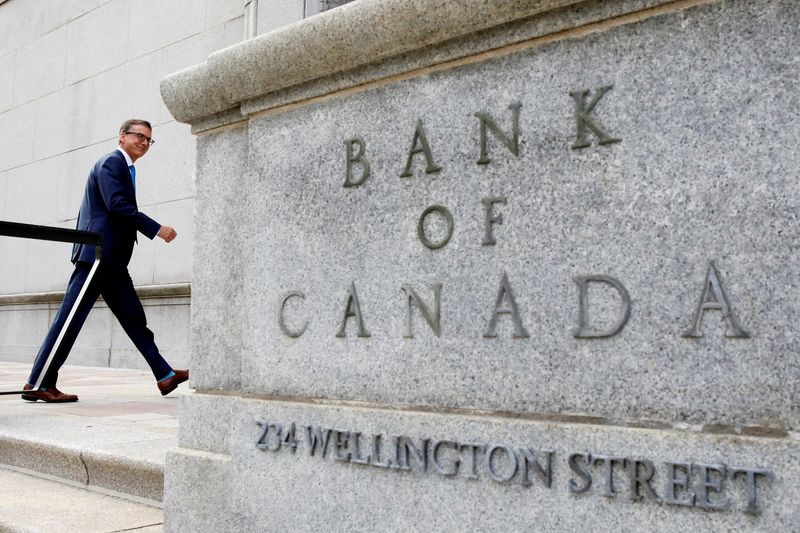By Julie Gordon
OTTAWA (Reuters) - Even as recession worries intensify in Canada, the central bank is likely to go ahead with another supersized interest rate hike next week after data showed underlying inflation was stubbornly persistent despite aggressive tightening, analysts said.
Money markets are betting on another 75-basis point move at the Bank of Canada's Oct. 26 meeting, taking its policy rate to a 14-year high at 4.0%. This will be on top of 300-bp worth of increases since March.
That eye-watering pace of tightening - and the promise of more to come - has economists, consumers and businesses increasingly certain Canada's economy will slip into a recession sometime in the next 12 months.
That may be just what the central bank is looking for, said analysts.
"They will never say it but I think they're perfectly willing to court recession in the backs of their minds," said Derek Holt, head of capital market economics at Scotiabank. "I think they are open to it as a necessary evil to combating inflation."
Two straight quarters of declining growth is termed as a recession.
Inflation in Canada edged down to 6.9% in September, below June's peak of 8.1%, though still well above the Bank of Canada's 2% target. Core price pressures showed little sign of easing, the data indicated on Wednesday.
"The Bank of Canada has clearly not slayed the inflation dragon yet," said Karyne Charbonneau, senior economist at CIBC Capital Markets, in a note. CIBC and other banks revised up their rate hike calls to 75-bp from 50-bp after the data.
While rapid rate increases have tamed at least one beast - Canada's red hot housing market as prices are down 21.6% from their February peak - it is not yet enough for the central bank.
Governor Tiff Macklem said last week the economy remains overheated and higher rates are needed to cool it, something he said can be done without triggering a recession.
"Saying that growth needs to slow doesn't imply that we need a big period of negative growth," Macklem told reporters.
"We're working on updating our projections and we'll see where we land, but I think you can expect to see pretty modest growth," he said. "That's still growth. That's not a recession."
But Macklem also warned a persistently strong U.S. dollar could mean higher rates. The higher rates go, the larger the risk of a soft-landing turning into a recession.
Canada's Finance Minister Chrystia Freeland on Wednesday cautioned unemployment will go up and the economy will slow, but stopped short of calling for a recession.
A majority of Canadian firms, meanwhile, think a recession is now likely in the next 12 months, a Bank of Canada survey showed this week.
Still, Royce Mendes, head of macro strategy at Desjardins Group, said Canadians would be remiss to assume this downturn would be typical, calling it a "monetary policy induced recession."
This means the central bank will not start cutting rates until inflation is "within shouting distance" of the 1-3% control range, he said.

But it is a risky business, said economists.
"I don't think they necessarily are aiming for a recession," said Andrew Kelvin, chief Canada strategist at TD Securities. "They're aiming to restore the credibility and bring inflation lower and if that requires a recession, then so be it."